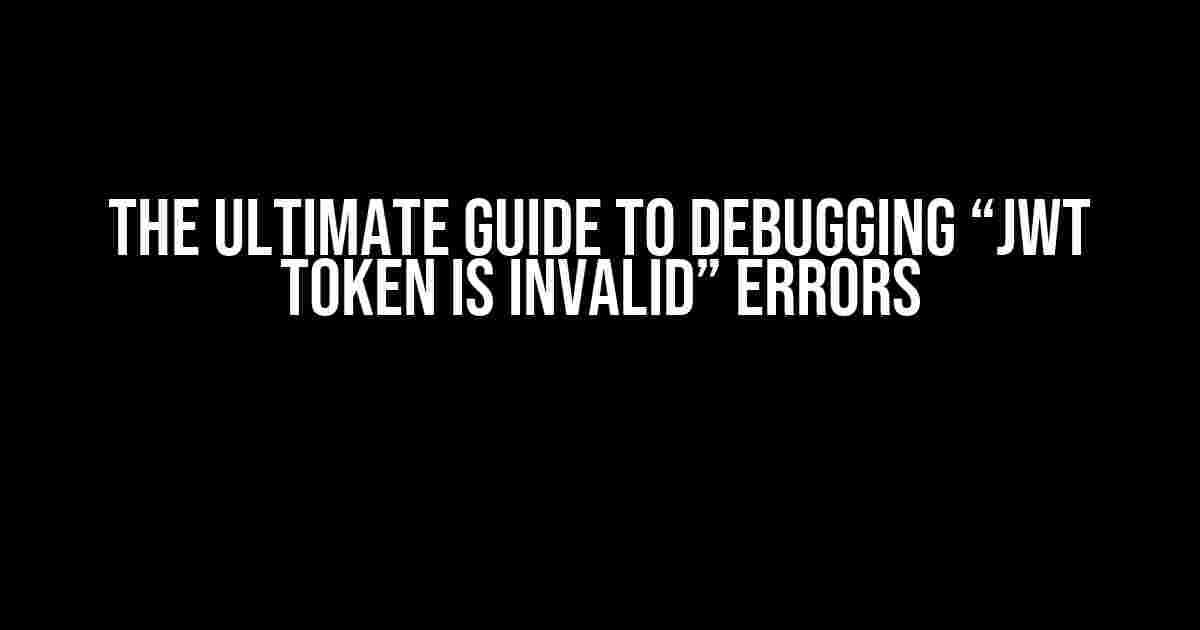Ah, the infamous “JWT token is invalid” error. You’ve likely encountered this frustrating message at least once in your development journey. But fear not, dear developer! This comprehensive guide is here to walk you through the troubleshooting process, providing clear and direct instructions to help you identify and resolve the issue.
What is a JWT Token Anyway?
Before we dive into the nitty-gritty of debugging, let’s take a step back and quickly review what a JWT token is. JSON Web Tokens (JWTs) are a type of token used for authentication and authorization in web applications. They contain a payload, which is a JSON object with information about the user, and a signature, which ensures the token’s integrity and authenticity.
{
"alg": "HS256",
"typ": "JWT"
}.
{
"user_id": 123,
"username": "johnDoe",
"exp": 1643723400
}.
[signature]
In the above example, the payload contains user information, such as the user ID and username, as well as an expiration timestamp (exp). The signature is generated by combining the payload with a secret key, ensuring that the token can’t be tampered with or altered.
The Anatomy of a “JWT Token is Invalid” Error
So, what happens when a JWT token is deemed invalid? There are several reasons why this error might occur, including:
Token has expired: The token has reached its expiration timestamp, rendering it invalid.Token is tampered with: The token’s payload or signature has been altered, making it invalid.Token is malformed: The token’s structure is incorrect, violating the JWT specification.Secret key mismatch: The secret key used to generate the token doesn’t match the one used to verify it.
Debugging Steps for “JWT Token is Invalid” Errors
Now that we’ve covered the basics, let’s dive into the step-by-step debugging process:
Step 1: Verify the Token’s Expiration
The first step is to check if the token has expired. You can do this by inspecting the token’s payload and looking for the expiration timestamp (exp). Use an online JWT decoder tool or a programming language of your choice to parse the token.
const jwt = require('jsonwebtoken');
const token = 'your_jwt_token_here';
const decodedToken = jwt.decode(token, { complete: true });
console.log(decodedToken.payload.exp);
If the token has expired, you’ll need to refresh or re-issue a new token with an updated expiration timestamp.
Step 2: Inspect the Token’s Payload and Signature
Next, verify that the token’s payload and signature are correct and match the expected format. Use a JWT decoder tool or your preferred programming language to inspect the token’s components.
const jwt = require('jsonwebtoken');
const token = 'your_jwt_token_here';
const decodedToken = jwt.decode(token, { complete: true });
console.log(decodedToken.header);
console.log(decodedToken.payload);
console.log(decodedToken.signature);
If the payload or signature appears to be tampered with or malformed, you’ll need to re-issue a new token with the correct information.
Step 3: Check the Secret Key
The secret key used to generate the token must match the one used to verify it. Ensure that both keys are identical and not hardcoded or stored in plain text.
const jwt = require('jsonwebtoken');
const secretKey = 'your_secret_key_here';
const token = 'your_jwt_token_here';
try {
jwt.verify(token, secretKey);
} catch (error) {
console.error('Secret key mismatch');
}
If the secret key mismatch is the culprit, update the verification process to use the correct key.
In addition to the debugging steps above, here are some common scenarios that might lead to a “JWT token is invalid” error:
| Scenario | Solution |
|---|---|
| Token issued from a different domain | Ensure the token is issued from the same domain as the verification process |
| Token contains incorrect or outdated information | Update the token’s payload with the correct information and re-issue a new token |
| Token is generated with an incorrect algorithm | Use the correct algorithm (e.g., HS256) when generating the token |
Best Practices for Working with JWT Tokens
Finally, here are some best practices to keep in mind when working with JWT tokens:
- Use secure secret keys: Store secret keys securely and never hardcode them.
- Use short-lived tokens: Set expiration timestamps to minimize the risk of token theft or misuse.
- Validate tokens on every request: Verify the token’s signature and payload on every request to ensure authenticity.
- Avoid using JWT tokens for sessions: Use JWT tokens for authentication and authorization, not for storing session data.
By following these best practices and debugging steps, you’ll be well-equipped to handle “JWT token is invalid” errors and ensure the security and integrity of your web application.
Conclusion
In conclusion, debugging “JWT token is invalid” errors requires a systematic approach and a solid understanding of how JWT tokens work. By identifying the root cause of the issue, whether it’s an expired token, tampered payload, or secret key mismatch, you can take corrective action to resolve the problem. Remember to follow best practices when working with JWT tokens to ensure the security and reliability of your application.
With this comprehensive guide, you’re now empowered to tackle “JWT token is invalid” errors with confidence and precision. Happy debugging!Here are the 5 Questions and Answers about “JWT token is invalid” in a creative voice and tone:
Frequently Asked Question
Having trouble with JWT tokens? Don’t worry, we’ve got you covered! Here are some frequently asked questions to help you troubleshoot those pesky “JWT token is invalid” errors:
What does “JWT token is invalid” even mean?
When a JWT token is invalid, it means that the token has been tampered with, expired, or is simply malformed. This can happen if the token is not generated correctly, if the server and client clocks are out of sync, or if someone tries to manipulate the token. Yep, it’s like trying to use a fake ID – it just won’t fly!
How do I know if my JWT token is expired?
Check the “exp” claim in your JWT token! If the expiration time has passed, the token is invalid. You can use a JWT decoder tool to inspect the token and check the expiration time. It’s like checking the expiration date on a carton of milk – if it’s past the expiration date, it’s time to get a new one!
I generated a new JWT token, but it’s still invalid. What’s going on?
Double-check your secret key! If the secret key used to generate the token doesn’t match the one used to verify it, the token will be invalid. It’s like trying to use a key to unlock a door, but the key is for a different lock. Make sure you’re using the correct secret key, and you should be good to go!
I’m getting a “JWT token is invalid” error, but I’m sure my token is correct. What else could be the problem?
Time to check your system clocks! If the server and client clocks are not in sync, it can cause token validation issues. Make sure your system clocks are synchronized, and you’re using a reliable time source. It’s like making sure your watch is set to the right time – if it’s off, you’ll be late for the party!
I’m still having trouble with JWT tokens. Where can I get more help?
Don’t worry, we’ve got your back! Check out our documentation, tutorials, and community forums for more information on JWT tokens and troubleshooting tips. You can also reach out to our support team for personalized help. We’re here to help you get your JWT tokens in check!
I hope this helps! Let me know if you need any further assistance.




